Organizational Behaviour Report: Culture, Power, and Motivation
VerifiedAdded on 2020/12/30
|19
|5958
|429
Report
AI Summary
This report provides an in-depth analysis of organizational behaviour, using 4com plc as a case study. It explores the influence of organizational culture, politics, and power on individual and team performance. The report delves into Handy's typology of organizational culture, examining power, role, task, and person cultures. It assesses the impact of power dynamics, organizational politics, and the characteristics of political behaviour. Furthermore, the report investigates content and process theories of motivation, including Maslow's hierarchy of needs, to identify ways to enhance employee performance and achieve organizational goals. The report also provides insights on how to improve team effectiveness by comparing effective and ineffective team characteristics, and applies concepts and philosophies of organizational behaviour to improve team effectiveness. The report concludes with recommendations for 4com plc to foster a positive and productive work environment.
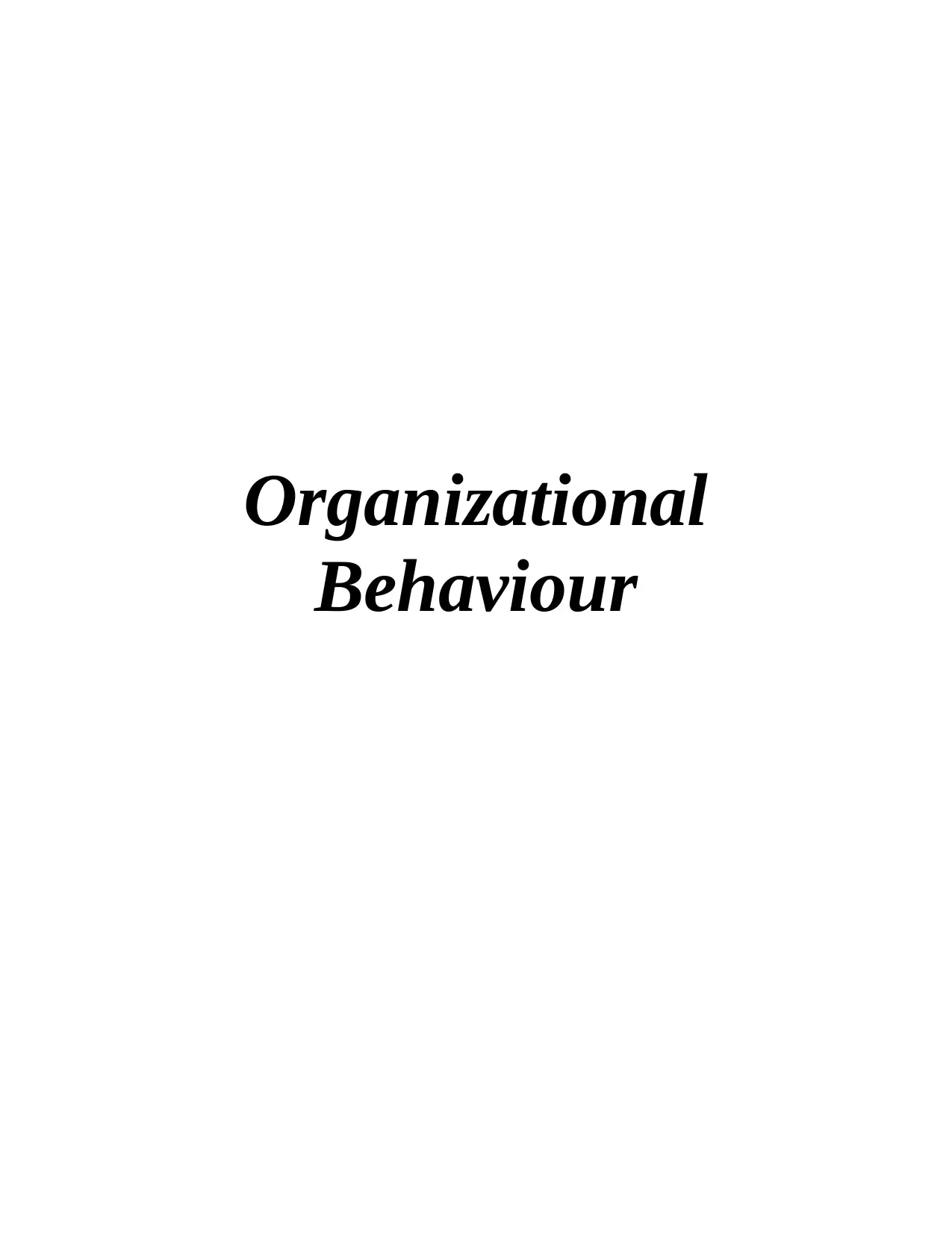
Organizational
Behaviour
Behaviour
Paraphrase This Document
Need a fresh take? Get an instant paraphrase of this document with our AI Paraphraser
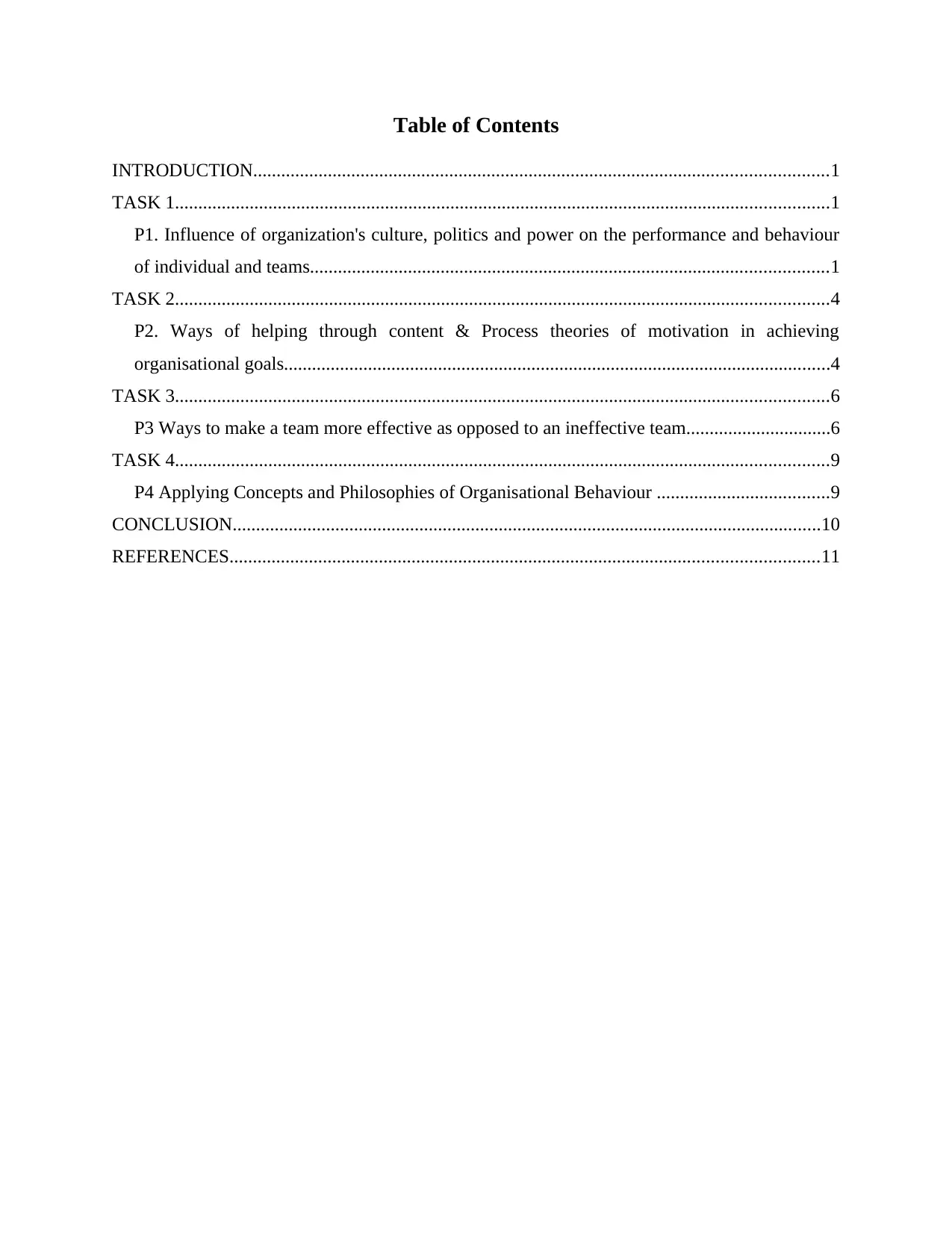
Table of Contents
INTRODUCTION...........................................................................................................................1
TASK 1............................................................................................................................................1
P1. Influence of organization's culture, politics and power on the performance and behaviour
of individual and teams...............................................................................................................1
TASK 2............................................................................................................................................4
P2. Ways of helping through content & Process theories of motivation in achieving
organisational goals.....................................................................................................................4
TASK 3............................................................................................................................................6
P3 Ways to make a team more effective as opposed to an ineffective team...............................6
TASK 4............................................................................................................................................9
P4 Applying Concepts and Philosophies of Organisational Behaviour .....................................9
CONCLUSION..............................................................................................................................10
REFERENCES..............................................................................................................................11
INTRODUCTION...........................................................................................................................1
TASK 1............................................................................................................................................1
P1. Influence of organization's culture, politics and power on the performance and behaviour
of individual and teams...............................................................................................................1
TASK 2............................................................................................................................................4
P2. Ways of helping through content & Process theories of motivation in achieving
organisational goals.....................................................................................................................4
TASK 3............................................................................................................................................6
P3 Ways to make a team more effective as opposed to an ineffective team...............................6
TASK 4............................................................................................................................................9
P4 Applying Concepts and Philosophies of Organisational Behaviour .....................................9
CONCLUSION..............................................................................................................................10
REFERENCES..............................................................................................................................11

⊘ This is a preview!⊘
Do you want full access?
Subscribe today to unlock all pages.

Trusted by 1+ million students worldwide
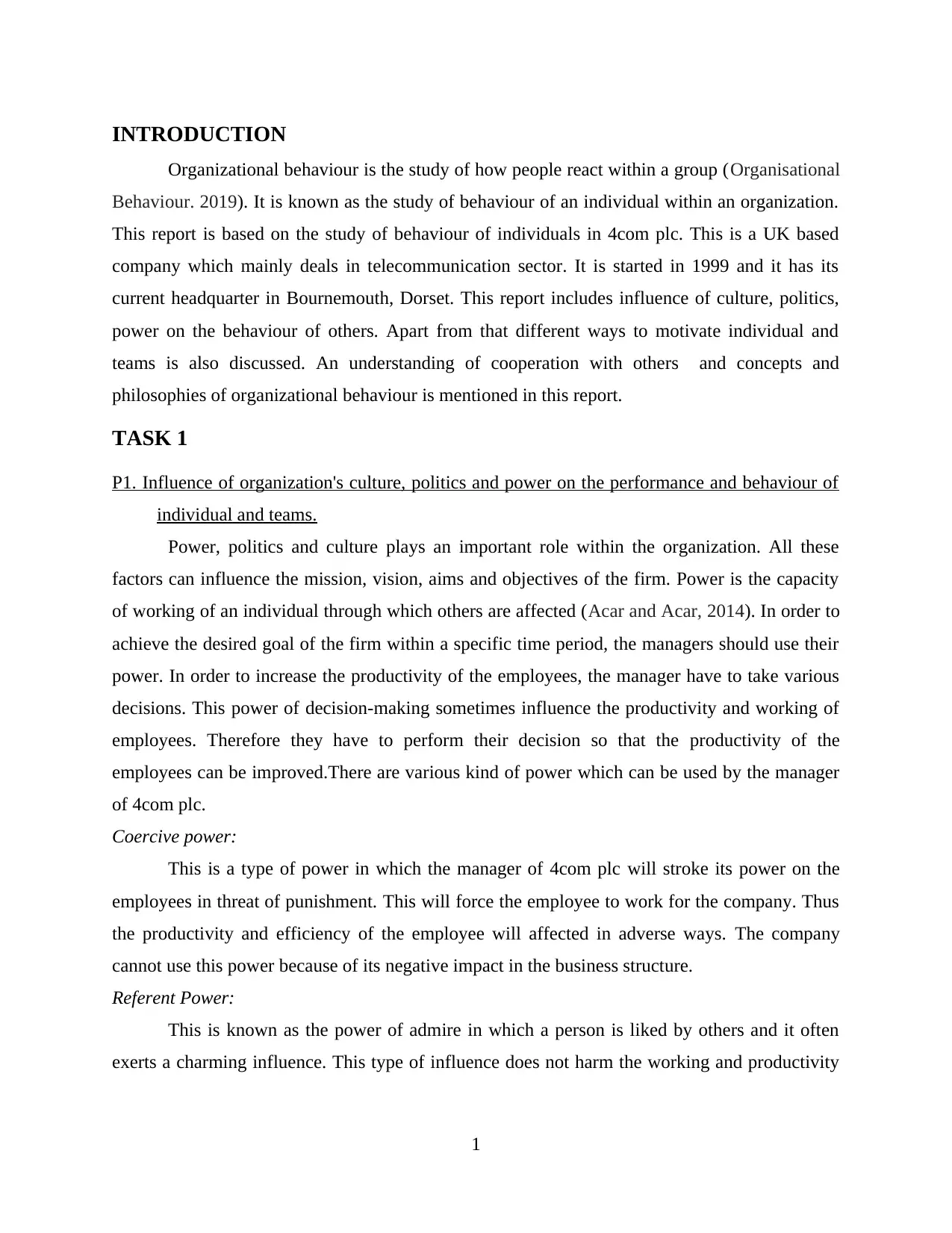
INTRODUCTION
Organizational behaviour is the study of how people react within a group (Organisational
Behaviour. 2019). It is known as the study of behaviour of an individual within an organization.
This report is based on the study of behaviour of individuals in 4com plc. This is a UK based
company which mainly deals in telecommunication sector. It is started in 1999 and it has its
current headquarter in Bournemouth, Dorset. This report includes influence of culture, politics,
power on the behaviour of others. Apart from that different ways to motivate individual and
teams is also discussed. An understanding of cooperation with others and concepts and
philosophies of organizational behaviour is mentioned in this report.
TASK 1
P1. Influence of organization's culture, politics and power on the performance and behaviour of
individual and teams.
Power, politics and culture plays an important role within the organization. All these
factors can influence the mission, vision, aims and objectives of the firm. Power is the capacity
of working of an individual through which others are affected (Acar and Acar, 2014). In order to
achieve the desired goal of the firm within a specific time period, the managers should use their
power. In order to increase the productivity of the employees, the manager have to take various
decisions. This power of decision-making sometimes influence the productivity and working of
employees. Therefore they have to perform their decision so that the productivity of the
employees can be improved.There are various kind of power which can be used by the manager
of 4com plc.
Coercive power:
This is a type of power in which the manager of 4com plc will stroke its power on the
employees in threat of punishment. This will force the employee to work for the company. Thus
the productivity and efficiency of the employee will affected in adverse ways. The company
cannot use this power because of its negative impact in the business structure.
Referent Power:
This is known as the power of admire in which a person is liked by others and it often
exerts a charming influence. This type of influence does not harm the working and productivity
1
Organizational behaviour is the study of how people react within a group (Organisational
Behaviour. 2019). It is known as the study of behaviour of an individual within an organization.
This report is based on the study of behaviour of individuals in 4com plc. This is a UK based
company which mainly deals in telecommunication sector. It is started in 1999 and it has its
current headquarter in Bournemouth, Dorset. This report includes influence of culture, politics,
power on the behaviour of others. Apart from that different ways to motivate individual and
teams is also discussed. An understanding of cooperation with others and concepts and
philosophies of organizational behaviour is mentioned in this report.
TASK 1
P1. Influence of organization's culture, politics and power on the performance and behaviour of
individual and teams.
Power, politics and culture plays an important role within the organization. All these
factors can influence the mission, vision, aims and objectives of the firm. Power is the capacity
of working of an individual through which others are affected (Acar and Acar, 2014). In order to
achieve the desired goal of the firm within a specific time period, the managers should use their
power. In order to increase the productivity of the employees, the manager have to take various
decisions. This power of decision-making sometimes influence the productivity and working of
employees. Therefore they have to perform their decision so that the productivity of the
employees can be improved.There are various kind of power which can be used by the manager
of 4com plc.
Coercive power:
This is a type of power in which the manager of 4com plc will stroke its power on the
employees in threat of punishment. This will force the employee to work for the company. Thus
the productivity and efficiency of the employee will affected in adverse ways. The company
cannot use this power because of its negative impact in the business structure.
Referent Power:
This is known as the power of admire in which a person is liked by others and it often
exerts a charming influence. This type of influence does not harm the working and productivity
1
Paraphrase This Document
Need a fresh take? Get an instant paraphrase of this document with our AI Paraphraser
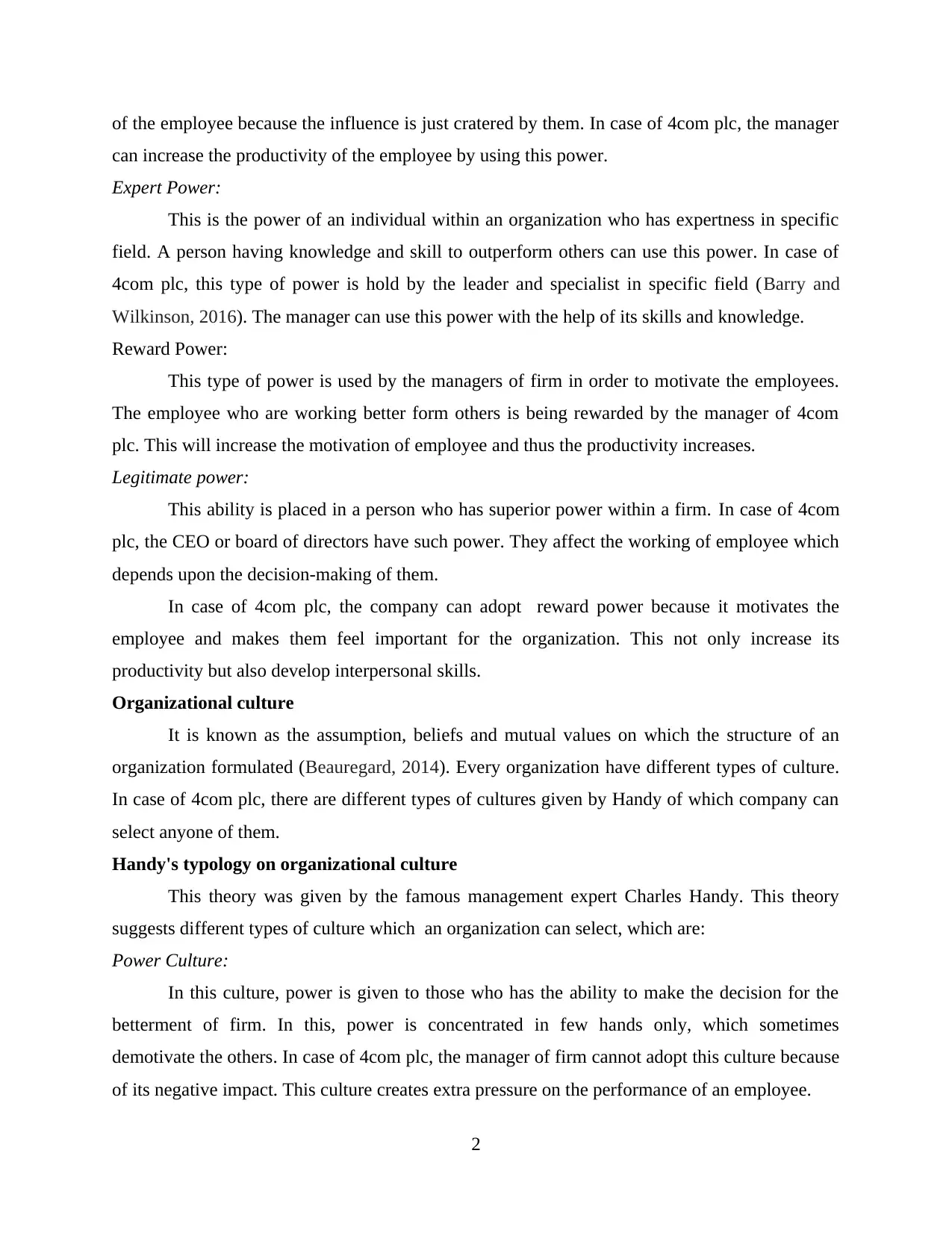
of the employee because the influence is just cratered by them. In case of 4com plc, the manager
can increase the productivity of the employee by using this power.
Expert Power:
This is the power of an individual within an organization who has expertness in specific
field. A person having knowledge and skill to outperform others can use this power. In case of
4com plc, this type of power is hold by the leader and specialist in specific field (Barry and
Wilkinson, 2016). The manager can use this power with the help of its skills and knowledge.
Reward Power:
This type of power is used by the managers of firm in order to motivate the employees.
The employee who are working better form others is being rewarded by the manager of 4com
plc. This will increase the motivation of employee and thus the productivity increases.
Legitimate power:
This ability is placed in a person who has superior power within a firm. In case of 4com
plc, the CEO or board of directors have such power. They affect the working of employee which
depends upon the decision-making of them.
In case of 4com plc, the company can adopt reward power because it motivates the
employee and makes them feel important for the organization. This not only increase its
productivity but also develop interpersonal skills.
Organizational culture
It is known as the assumption, beliefs and mutual values on which the structure of an
organization formulated (Beauregard, 2014). Every organization have different types of culture.
In case of 4com plc, there are different types of cultures given by Handy of which company can
select anyone of them.
Handy's typology on organizational culture
This theory was given by the famous management expert Charles Handy. This theory
suggests different types of culture which an organization can select, which are:
Power Culture:
In this culture, power is given to those who has the ability to make the decision for the
betterment of firm. In this, power is concentrated in few hands only, which sometimes
demotivate the others. In case of 4com plc, the manager of firm cannot adopt this culture because
of its negative impact. This culture creates extra pressure on the performance of an employee.
2
can increase the productivity of the employee by using this power.
Expert Power:
This is the power of an individual within an organization who has expertness in specific
field. A person having knowledge and skill to outperform others can use this power. In case of
4com plc, this type of power is hold by the leader and specialist in specific field (Barry and
Wilkinson, 2016). The manager can use this power with the help of its skills and knowledge.
Reward Power:
This type of power is used by the managers of firm in order to motivate the employees.
The employee who are working better form others is being rewarded by the manager of 4com
plc. This will increase the motivation of employee and thus the productivity increases.
Legitimate power:
This ability is placed in a person who has superior power within a firm. In case of 4com
plc, the CEO or board of directors have such power. They affect the working of employee which
depends upon the decision-making of them.
In case of 4com plc, the company can adopt reward power because it motivates the
employee and makes them feel important for the organization. This not only increase its
productivity but also develop interpersonal skills.
Organizational culture
It is known as the assumption, beliefs and mutual values on which the structure of an
organization formulated (Beauregard, 2014). Every organization have different types of culture.
In case of 4com plc, there are different types of cultures given by Handy of which company can
select anyone of them.
Handy's typology on organizational culture
This theory was given by the famous management expert Charles Handy. This theory
suggests different types of culture which an organization can select, which are:
Power Culture:
In this culture, power is given to those who has the ability to make the decision for the
betterment of firm. In this, power is concentrated in few hands only, which sometimes
demotivate the others. In case of 4com plc, the manager of firm cannot adopt this culture because
of its negative impact. This culture creates extra pressure on the performance of an employee.
2
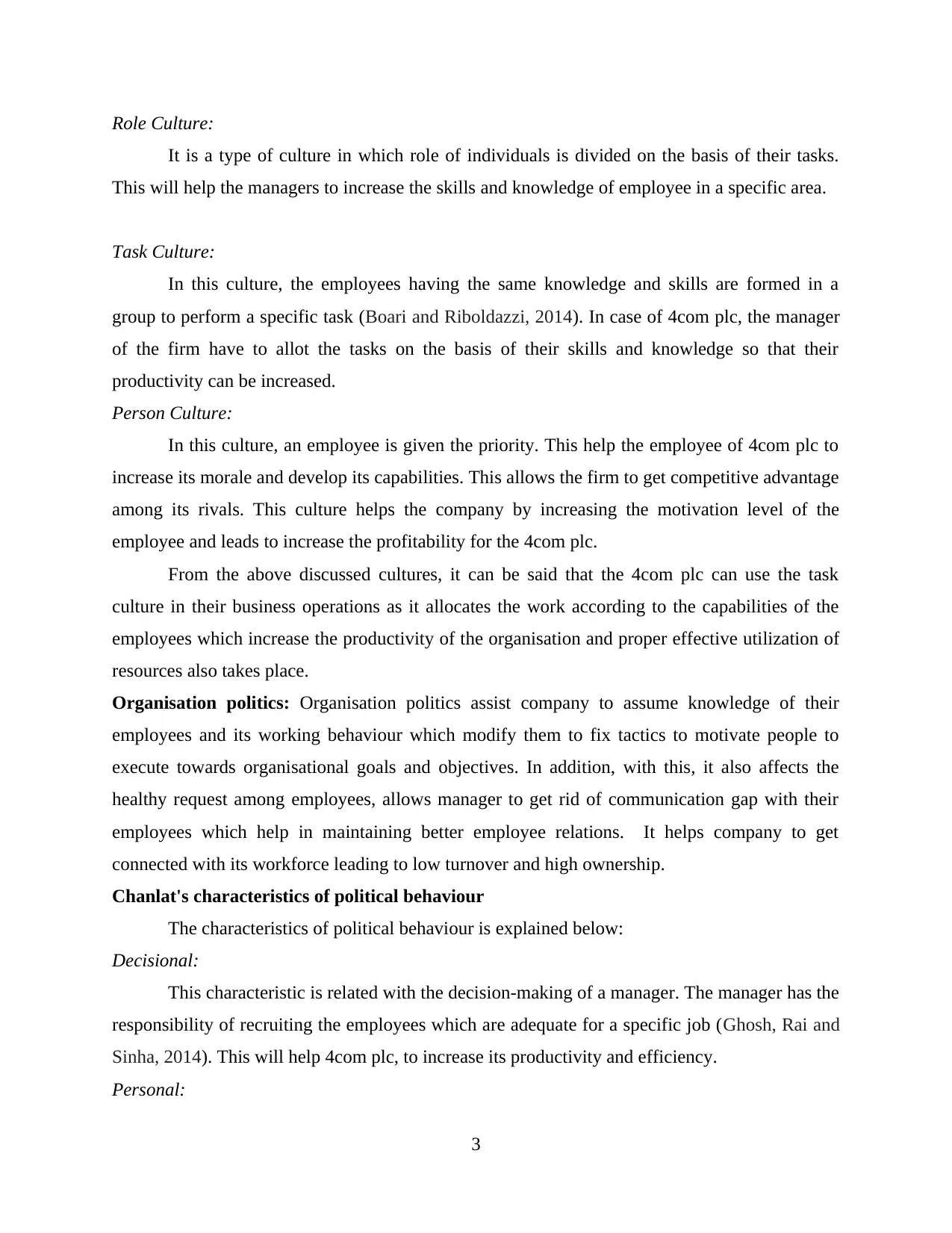
Role Culture:
It is a type of culture in which role of individuals is divided on the basis of their tasks.
This will help the managers to increase the skills and knowledge of employee in a specific area.
Task Culture:
In this culture, the employees having the same knowledge and skills are formed in a
group to perform a specific task (Boari and Riboldazzi, 2014). In case of 4com plc, the manager
of the firm have to allot the tasks on the basis of their skills and knowledge so that their
productivity can be increased.
Person Culture:
In this culture, an employee is given the priority. This help the employee of 4com plc to
increase its morale and develop its capabilities. This allows the firm to get competitive advantage
among its rivals. This culture helps the company by increasing the motivation level of the
employee and leads to increase the profitability for the 4com plc.
From the above discussed cultures, it can be said that the 4com plc can use the task
culture in their business operations as it allocates the work according to the capabilities of the
employees which increase the productivity of the organisation and proper effective utilization of
resources also takes place.
Organisation politics: Organisation politics assist company to assume knowledge of their
employees and its working behaviour which modify them to fix tactics to motivate people to
execute towards organisational goals and objectives. In addition, with this, it also affects the
healthy request among employees, allows manager to get rid of communication gap with their
employees which help in maintaining better employee relations. It helps company to get
connected with its workforce leading to low turnover and high ownership.
Chanlat's characteristics of political behaviour
The characteristics of political behaviour is explained below:
Decisional:
This characteristic is related with the decision-making of a manager. The manager has the
responsibility of recruiting the employees which are adequate for a specific job (Ghosh, Rai and
Sinha, 2014). This will help 4com plc, to increase its productivity and efficiency.
Personal:
3
It is a type of culture in which role of individuals is divided on the basis of their tasks.
This will help the managers to increase the skills and knowledge of employee in a specific area.
Task Culture:
In this culture, the employees having the same knowledge and skills are formed in a
group to perform a specific task (Boari and Riboldazzi, 2014). In case of 4com plc, the manager
of the firm have to allot the tasks on the basis of their skills and knowledge so that their
productivity can be increased.
Person Culture:
In this culture, an employee is given the priority. This help the employee of 4com plc to
increase its morale and develop its capabilities. This allows the firm to get competitive advantage
among its rivals. This culture helps the company by increasing the motivation level of the
employee and leads to increase the profitability for the 4com plc.
From the above discussed cultures, it can be said that the 4com plc can use the task
culture in their business operations as it allocates the work according to the capabilities of the
employees which increase the productivity of the organisation and proper effective utilization of
resources also takes place.
Organisation politics: Organisation politics assist company to assume knowledge of their
employees and its working behaviour which modify them to fix tactics to motivate people to
execute towards organisational goals and objectives. In addition, with this, it also affects the
healthy request among employees, allows manager to get rid of communication gap with their
employees which help in maintaining better employee relations. It helps company to get
connected with its workforce leading to low turnover and high ownership.
Chanlat's characteristics of political behaviour
The characteristics of political behaviour is explained below:
Decisional:
This characteristic is related with the decision-making of a manager. The manager has the
responsibility of recruiting the employees which are adequate for a specific job (Ghosh, Rai and
Sinha, 2014). This will help 4com plc, to increase its productivity and efficiency.
Personal:
3
⊘ This is a preview!⊘
Do you want full access?
Subscribe today to unlock all pages.

Trusted by 1+ million students worldwide
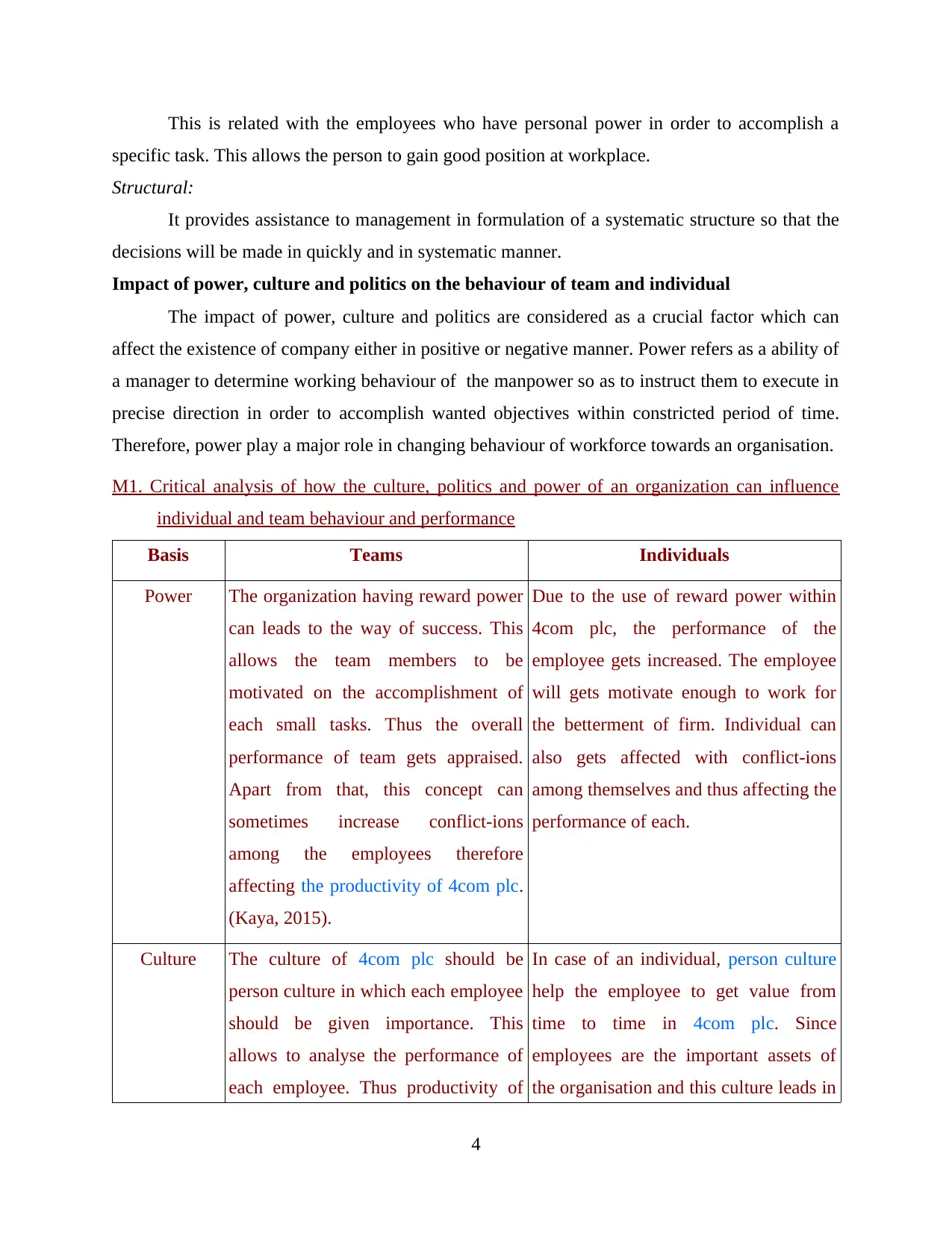
This is related with the employees who have personal power in order to accomplish a
specific task. This allows the person to gain good position at workplace.
Structural:
It provides assistance to management in formulation of a systematic structure so that the
decisions will be made in quickly and in systematic manner.
Impact of power, culture and politics on the behaviour of team and individual
The impact of power, culture and politics are considered as a crucial factor which can
affect the existence of company either in positive or negative manner. Power refers as a ability of
a manager to determine working behaviour of the manpower so as to instruct them to execute in
precise direction in order to accomplish wanted objectives within constricted period of time.
Therefore, power play a major role in changing behaviour of workforce towards an organisation.
M1. Critical analysis of how the culture, politics and power of an organization can influence
individual and team behaviour and performance
Basis Teams Individuals
Power The organization having reward power
can leads to the way of success. This
allows the team members to be
motivated on the accomplishment of
each small tasks. Thus the overall
performance of team gets appraised.
Apart from that, this concept can
sometimes increase conflict-ions
among the employees therefore
affecting the productivity of 4com plc.
(Kaya, 2015).
Due to the use of reward power within
4com plc, the performance of the
employee gets increased. The employee
will gets motivate enough to work for
the betterment of firm. Individual can
also gets affected with conflict-ions
among themselves and thus affecting the
performance of each.
Culture The culture of 4com plc should be
person culture in which each employee
should be given importance. This
allows to analyse the performance of
each employee. Thus productivity of
In case of an individual, person culture
help the employee to get value from
time to time in 4com plc. Since
employees are the important assets of
the organisation and this culture leads in
4
specific task. This allows the person to gain good position at workplace.
Structural:
It provides assistance to management in formulation of a systematic structure so that the
decisions will be made in quickly and in systematic manner.
Impact of power, culture and politics on the behaviour of team and individual
The impact of power, culture and politics are considered as a crucial factor which can
affect the existence of company either in positive or negative manner. Power refers as a ability of
a manager to determine working behaviour of the manpower so as to instruct them to execute in
precise direction in order to accomplish wanted objectives within constricted period of time.
Therefore, power play a major role in changing behaviour of workforce towards an organisation.
M1. Critical analysis of how the culture, politics and power of an organization can influence
individual and team behaviour and performance
Basis Teams Individuals
Power The organization having reward power
can leads to the way of success. This
allows the team members to be
motivated on the accomplishment of
each small tasks. Thus the overall
performance of team gets appraised.
Apart from that, this concept can
sometimes increase conflict-ions
among the employees therefore
affecting the productivity of 4com plc.
(Kaya, 2015).
Due to the use of reward power within
4com plc, the performance of the
employee gets increased. The employee
will gets motivate enough to work for
the betterment of firm. Individual can
also gets affected with conflict-ions
among themselves and thus affecting the
performance of each.
Culture The culture of 4com plc should be
person culture in which each employee
should be given importance. This
allows to analyse the performance of
each employee. Thus productivity of
In case of an individual, person culture
help the employee to get value from
time to time in 4com plc. Since
employees are the important assets of
the organisation and this culture leads in
4
Paraphrase This Document
Need a fresh take? Get an instant paraphrase of this document with our AI Paraphraser
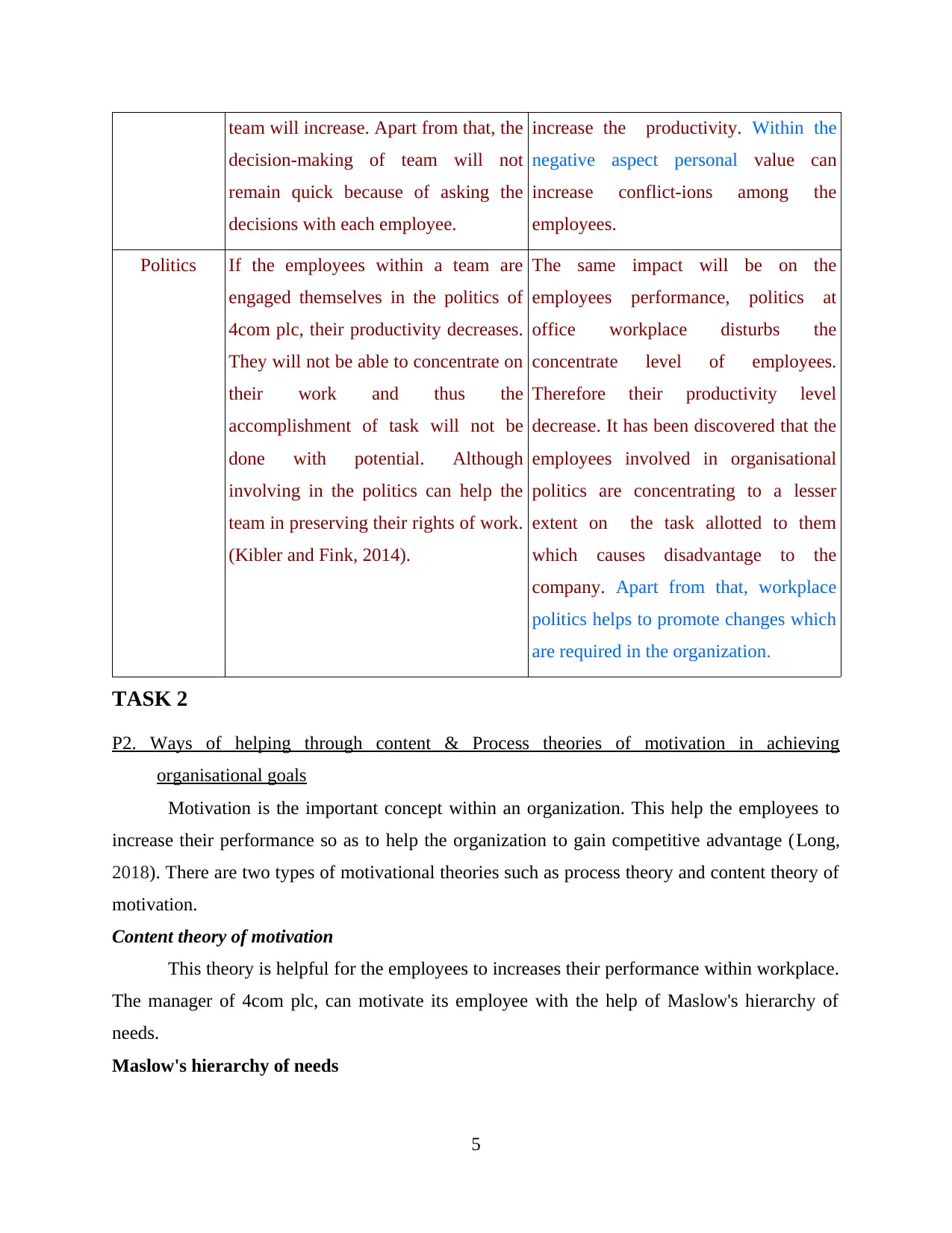
team will increase. Apart from that, the
decision-making of team will not
remain quick because of asking the
decisions with each employee.
increase the productivity. Within the
negative aspect personal value can
increase conflict-ions among the
employees.
Politics If the employees within a team are
engaged themselves in the politics of
4com plc, their productivity decreases.
They will not be able to concentrate on
their work and thus the
accomplishment of task will not be
done with potential. Although
involving in the politics can help the
team in preserving their rights of work.
(Kibler and Fink, 2014).
The same impact will be on the
employees performance, politics at
office workplace disturbs the
concentrate level of employees.
Therefore their productivity level
decrease. It has been discovered that the
employees involved in organisational
politics are concentrating to a lesser
extent on the task allotted to them
which causes disadvantage to the
company. Apart from that, workplace
politics helps to promote changes which
are required in the organization.
TASK 2
P2. Ways of helping through content & Process theories of motivation in achieving
organisational goals
Motivation is the important concept within an organization. This help the employees to
increase their performance so as to help the organization to gain competitive advantage (Long,
2018). There are two types of motivational theories such as process theory and content theory of
motivation.
Content theory of motivation
This theory is helpful for the employees to increases their performance within workplace.
The manager of 4com plc, can motivate its employee with the help of Maslow's hierarchy of
needs.
Maslow's hierarchy of needs
5
decision-making of team will not
remain quick because of asking the
decisions with each employee.
increase the productivity. Within the
negative aspect personal value can
increase conflict-ions among the
employees.
Politics If the employees within a team are
engaged themselves in the politics of
4com plc, their productivity decreases.
They will not be able to concentrate on
their work and thus the
accomplishment of task will not be
done with potential. Although
involving in the politics can help the
team in preserving their rights of work.
(Kibler and Fink, 2014).
The same impact will be on the
employees performance, politics at
office workplace disturbs the
concentrate level of employees.
Therefore their productivity level
decrease. It has been discovered that the
employees involved in organisational
politics are concentrating to a lesser
extent on the task allotted to them
which causes disadvantage to the
company. Apart from that, workplace
politics helps to promote changes which
are required in the organization.
TASK 2
P2. Ways of helping through content & Process theories of motivation in achieving
organisational goals
Motivation is the important concept within an organization. This help the employees to
increase their performance so as to help the organization to gain competitive advantage (Long,
2018). There are two types of motivational theories such as process theory and content theory of
motivation.
Content theory of motivation
This theory is helpful for the employees to increases their performance within workplace.
The manager of 4com plc, can motivate its employee with the help of Maslow's hierarchy of
needs.
Maslow's hierarchy of needs
5
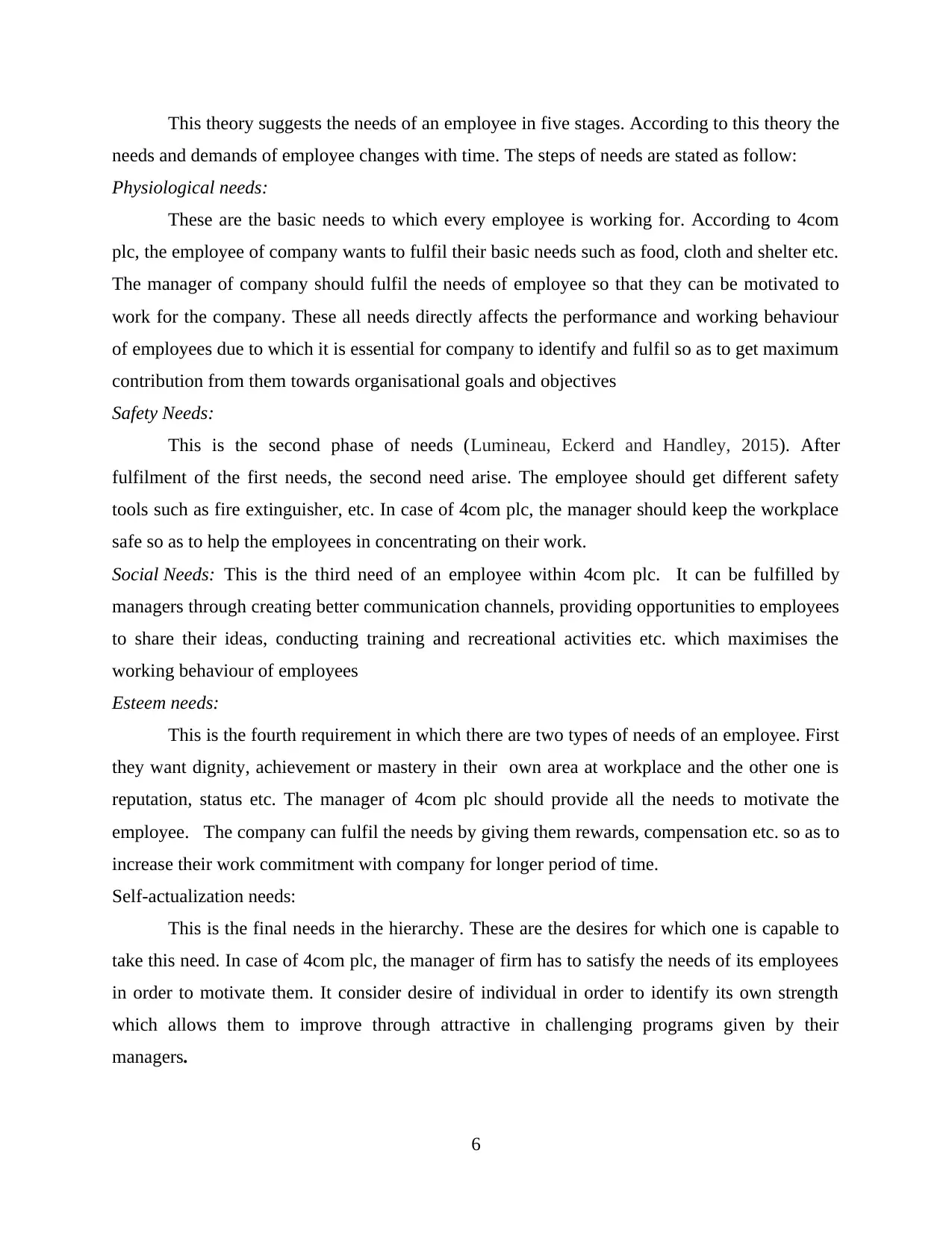
This theory suggests the needs of an employee in five stages. According to this theory the
needs and demands of employee changes with time. The steps of needs are stated as follow:
Physiological needs:
These are the basic needs to which every employee is working for. According to 4com
plc, the employee of company wants to fulfil their basic needs such as food, cloth and shelter etc.
The manager of company should fulfil the needs of employee so that they can be motivated to
work for the company. These all needs directly affects the performance and working behaviour
of employees due to which it is essential for company to identify and fulfil so as to get maximum
contribution from them towards organisational goals and objectives
Safety Needs:
This is the second phase of needs (Lumineau, Eckerd and Handley, 2015). After
fulfilment of the first needs, the second need arise. The employee should get different safety
tools such as fire extinguisher, etc. In case of 4com plc, the manager should keep the workplace
safe so as to help the employees in concentrating on their work.
Social Needs: This is the third need of an employee within 4com plc. It can be fulfilled by
managers through creating better communication channels, providing opportunities to employees
to share their ideas, conducting training and recreational activities etc. which maximises the
working behaviour of employees
Esteem needs:
This is the fourth requirement in which there are two types of needs of an employee. First
they want dignity, achievement or mastery in their own area at workplace and the other one is
reputation, status etc. The manager of 4com plc should provide all the needs to motivate the
employee. The company can fulfil the needs by giving them rewards, compensation etc. so as to
increase their work commitment with company for longer period of time.
Self-actualization needs:
This is the final needs in the hierarchy. These are the desires for which one is capable to
take this need. In case of 4com plc, the manager of firm has to satisfy the needs of its employees
in order to motivate them. It consider desire of individual in order to identify its own strength
which allows them to improve through attractive in challenging programs given by their
managers.
6
needs and demands of employee changes with time. The steps of needs are stated as follow:
Physiological needs:
These are the basic needs to which every employee is working for. According to 4com
plc, the employee of company wants to fulfil their basic needs such as food, cloth and shelter etc.
The manager of company should fulfil the needs of employee so that they can be motivated to
work for the company. These all needs directly affects the performance and working behaviour
of employees due to which it is essential for company to identify and fulfil so as to get maximum
contribution from them towards organisational goals and objectives
Safety Needs:
This is the second phase of needs (Lumineau, Eckerd and Handley, 2015). After
fulfilment of the first needs, the second need arise. The employee should get different safety
tools such as fire extinguisher, etc. In case of 4com plc, the manager should keep the workplace
safe so as to help the employees in concentrating on their work.
Social Needs: This is the third need of an employee within 4com plc. It can be fulfilled by
managers through creating better communication channels, providing opportunities to employees
to share their ideas, conducting training and recreational activities etc. which maximises the
working behaviour of employees
Esteem needs:
This is the fourth requirement in which there are two types of needs of an employee. First
they want dignity, achievement or mastery in their own area at workplace and the other one is
reputation, status etc. The manager of 4com plc should provide all the needs to motivate the
employee. The company can fulfil the needs by giving them rewards, compensation etc. so as to
increase their work commitment with company for longer period of time.
Self-actualization needs:
This is the final needs in the hierarchy. These are the desires for which one is capable to
take this need. In case of 4com plc, the manager of firm has to satisfy the needs of its employees
in order to motivate them. It consider desire of individual in order to identify its own strength
which allows them to improve through attractive in challenging programs given by their
managers.
6
⊘ This is a preview!⊘
Do you want full access?
Subscribe today to unlock all pages.

Trusted by 1+ million students worldwide
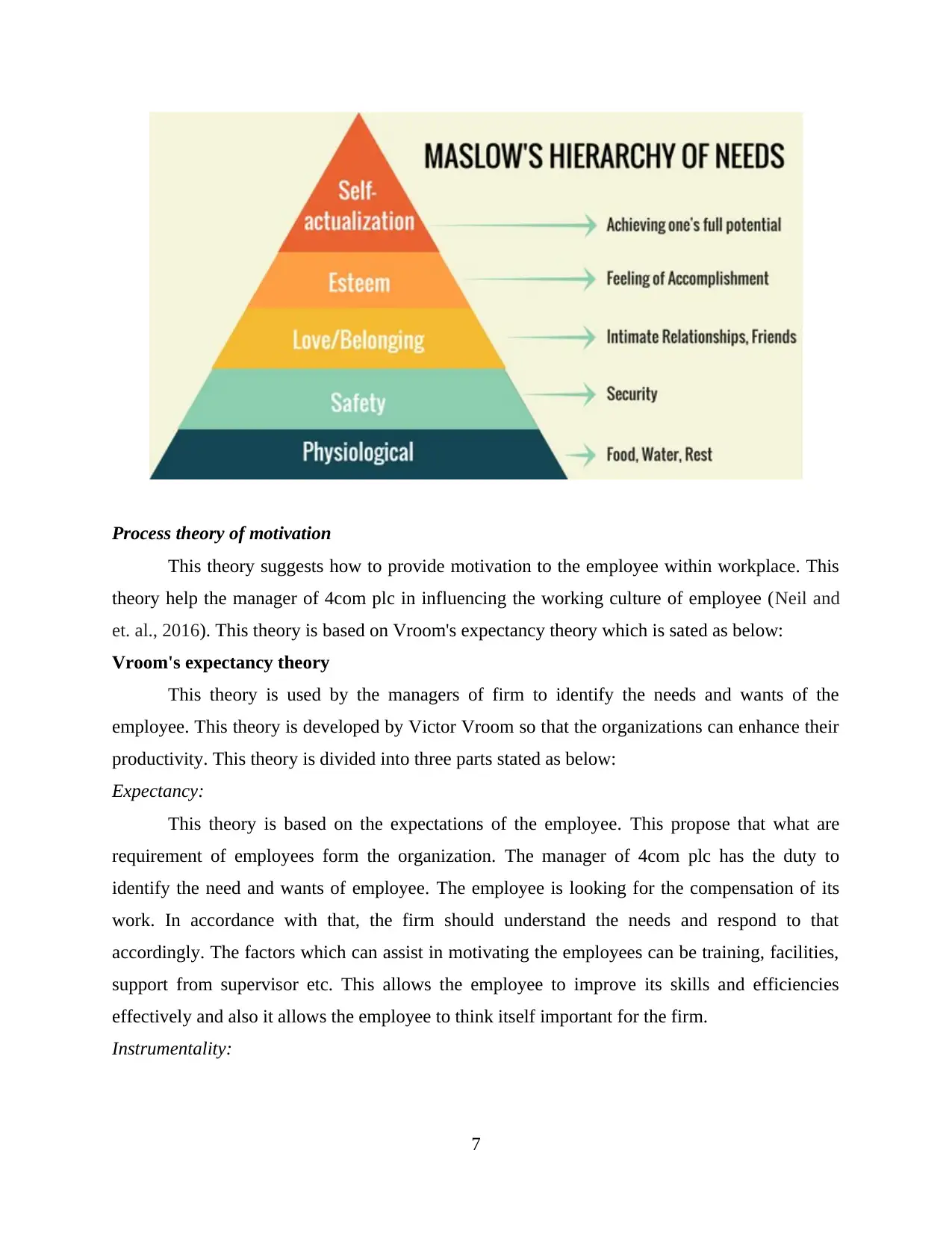
Process theory of motivation
This theory suggests how to provide motivation to the employee within workplace. This
theory help the manager of 4com plc in influencing the working culture of employee (Neil and
et. al., 2016). This theory is based on Vroom's expectancy theory which is sated as below:
Vroom's expectancy theory
This theory is used by the managers of firm to identify the needs and wants of the
employee. This theory is developed by Victor Vroom so that the organizations can enhance their
productivity. This theory is divided into three parts stated as below:
Expectancy:
This theory is based on the expectations of the employee. This propose that what are
requirement of employees form the organization. The manager of 4com plc has the duty to
identify the need and wants of employee. The employee is looking for the compensation of its
work. In accordance with that, the firm should understand the needs and respond to that
accordingly. The factors which can assist in motivating the employees can be training, facilities,
support from supervisor etc. This allows the employee to improve its skills and efficiencies
effectively and also it allows the employee to think itself important for the firm.
Instrumentality:
7
This theory suggests how to provide motivation to the employee within workplace. This
theory help the manager of 4com plc in influencing the working culture of employee (Neil and
et. al., 2016). This theory is based on Vroom's expectancy theory which is sated as below:
Vroom's expectancy theory
This theory is used by the managers of firm to identify the needs and wants of the
employee. This theory is developed by Victor Vroom so that the organizations can enhance their
productivity. This theory is divided into three parts stated as below:
Expectancy:
This theory is based on the expectations of the employee. This propose that what are
requirement of employees form the organization. The manager of 4com plc has the duty to
identify the need and wants of employee. The employee is looking for the compensation of its
work. In accordance with that, the firm should understand the needs and respond to that
accordingly. The factors which can assist in motivating the employees can be training, facilities,
support from supervisor etc. This allows the employee to improve its skills and efficiencies
effectively and also it allows the employee to think itself important for the firm.
Instrumentality:
7
Paraphrase This Document
Need a fresh take? Get an instant paraphrase of this document with our AI Paraphraser
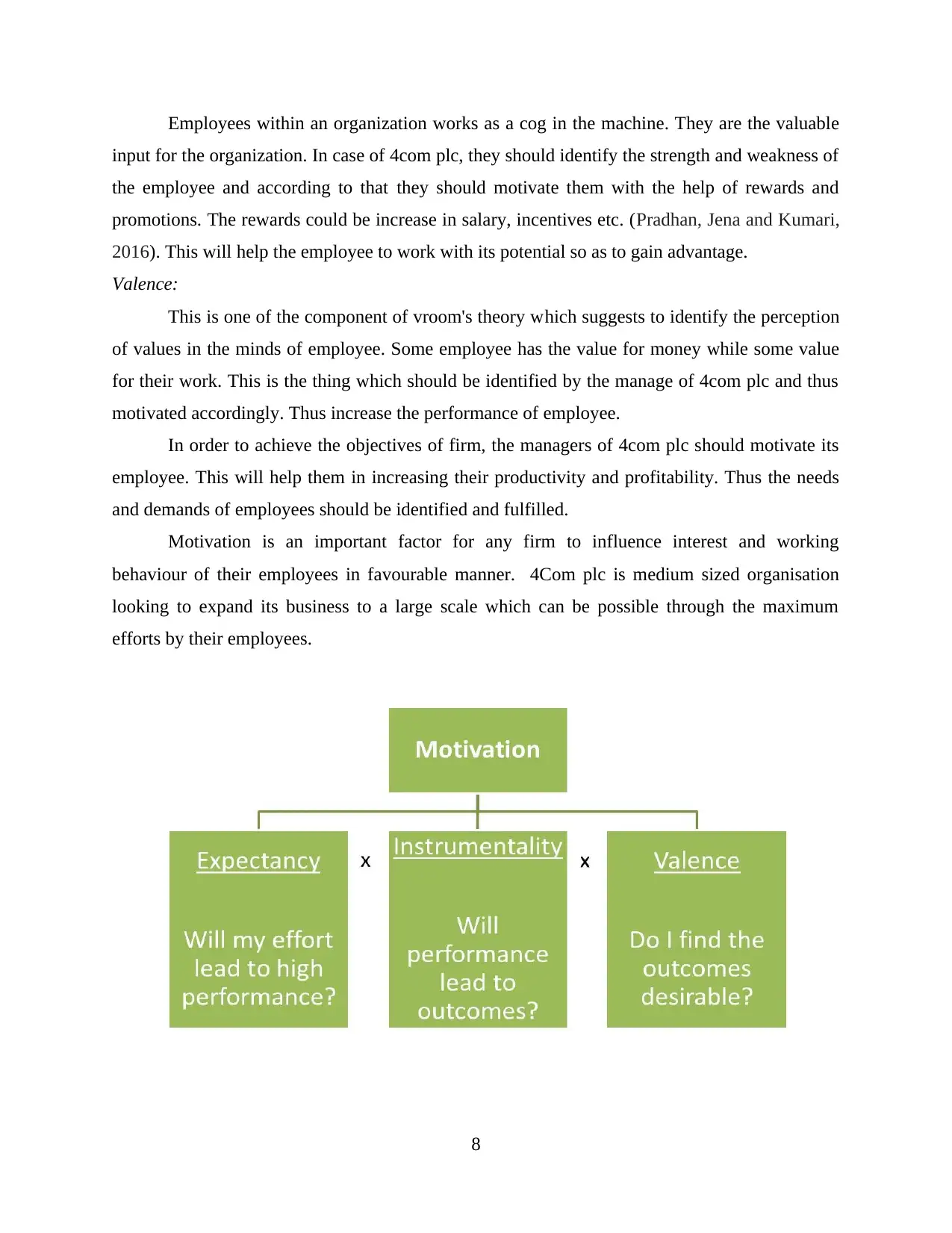
Employees within an organization works as a cog in the machine. They are the valuable
input for the organization. In case of 4com plc, they should identify the strength and weakness of
the employee and according to that they should motivate them with the help of rewards and
promotions. The rewards could be increase in salary, incentives etc. (Pradhan, Jena and Kumari,
2016). This will help the employee to work with its potential so as to gain advantage.
Valence:
This is one of the component of vroom's theory which suggests to identify the perception
of values in the minds of employee. Some employee has the value for money while some value
for their work. This is the thing which should be identified by the manage of 4com plc and thus
motivated accordingly. Thus increase the performance of employee.
In order to achieve the objectives of firm, the managers of 4com plc should motivate its
employee. This will help them in increasing their productivity and profitability. Thus the needs
and demands of employees should be identified and fulfilled.
Motivation is an important factor for any firm to influence interest and working
behaviour of their employees in favourable manner. 4Com plc is medium sized organisation
looking to expand its business to a large scale which can be possible through the maximum
efforts by their employees.
8
input for the organization. In case of 4com plc, they should identify the strength and weakness of
the employee and according to that they should motivate them with the help of rewards and
promotions. The rewards could be increase in salary, incentives etc. (Pradhan, Jena and Kumari,
2016). This will help the employee to work with its potential so as to gain advantage.
Valence:
This is one of the component of vroom's theory which suggests to identify the perception
of values in the minds of employee. Some employee has the value for money while some value
for their work. This is the thing which should be identified by the manage of 4com plc and thus
motivated accordingly. Thus increase the performance of employee.
In order to achieve the objectives of firm, the managers of 4com plc should motivate its
employee. This will help them in increasing their productivity and profitability. Thus the needs
and demands of employees should be identified and fulfilled.
Motivation is an important factor for any firm to influence interest and working
behaviour of their employees in favourable manner. 4Com plc is medium sized organisation
looking to expand its business to a large scale which can be possible through the maximum
efforts by their employees.
8
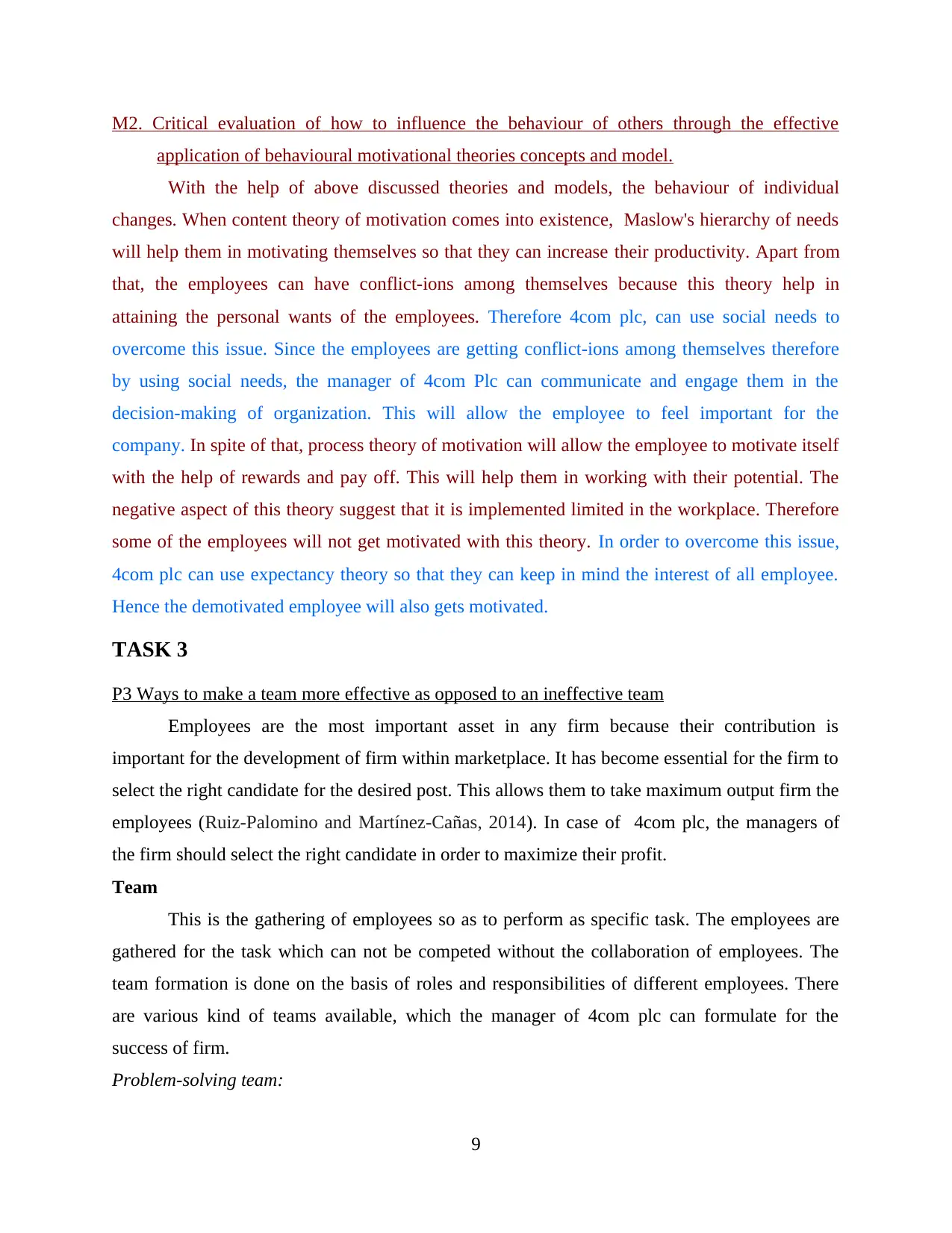
M2. Critical evaluation of how to influence the behaviour of others through the effective
application of behavioural motivational theories concepts and model.
With the help of above discussed theories and models, the behaviour of individual
changes. When content theory of motivation comes into existence, Maslow's hierarchy of needs
will help them in motivating themselves so that they can increase their productivity. Apart from
that, the employees can have conflict-ions among themselves because this theory help in
attaining the personal wants of the employees. Therefore 4com plc, can use social needs to
overcome this issue. Since the employees are getting conflict-ions among themselves therefore
by using social needs, the manager of 4com Plc can communicate and engage them in the
decision-making of organization. This will allow the employee to feel important for the
company. In spite of that, process theory of motivation will allow the employee to motivate itself
with the help of rewards and pay off. This will help them in working with their potential. The
negative aspect of this theory suggest that it is implemented limited in the workplace. Therefore
some of the employees will not get motivated with this theory. In order to overcome this issue,
4com plc can use expectancy theory so that they can keep in mind the interest of all employee.
Hence the demotivated employee will also gets motivated.
TASK 3
P3 Ways to make a team more effective as opposed to an ineffective team
Employees are the most important asset in any firm because their contribution is
important for the development of firm within marketplace. It has become essential for the firm to
select the right candidate for the desired post. This allows them to take maximum output firm the
employees (Ruiz-Palomino and Martínez-Cañas, 2014). In case of 4com plc, the managers of
the firm should select the right candidate in order to maximize their profit.
Team
This is the gathering of employees so as to perform as specific task. The employees are
gathered for the task which can not be competed without the collaboration of employees. The
team formation is done on the basis of roles and responsibilities of different employees. There
are various kind of teams available, which the manager of 4com plc can formulate for the
success of firm.
Problem-solving team:
9
application of behavioural motivational theories concepts and model.
With the help of above discussed theories and models, the behaviour of individual
changes. When content theory of motivation comes into existence, Maslow's hierarchy of needs
will help them in motivating themselves so that they can increase their productivity. Apart from
that, the employees can have conflict-ions among themselves because this theory help in
attaining the personal wants of the employees. Therefore 4com plc, can use social needs to
overcome this issue. Since the employees are getting conflict-ions among themselves therefore
by using social needs, the manager of 4com Plc can communicate and engage them in the
decision-making of organization. This will allow the employee to feel important for the
company. In spite of that, process theory of motivation will allow the employee to motivate itself
with the help of rewards and pay off. This will help them in working with their potential. The
negative aspect of this theory suggest that it is implemented limited in the workplace. Therefore
some of the employees will not get motivated with this theory. In order to overcome this issue,
4com plc can use expectancy theory so that they can keep in mind the interest of all employee.
Hence the demotivated employee will also gets motivated.
TASK 3
P3 Ways to make a team more effective as opposed to an ineffective team
Employees are the most important asset in any firm because their contribution is
important for the development of firm within marketplace. It has become essential for the firm to
select the right candidate for the desired post. This allows them to take maximum output firm the
employees (Ruiz-Palomino and Martínez-Cañas, 2014). In case of 4com plc, the managers of
the firm should select the right candidate in order to maximize their profit.
Team
This is the gathering of employees so as to perform as specific task. The employees are
gathered for the task which can not be competed without the collaboration of employees. The
team formation is done on the basis of roles and responsibilities of different employees. There
are various kind of teams available, which the manager of 4com plc can formulate for the
success of firm.
Problem-solving team:
9
⊘ This is a preview!⊘
Do you want full access?
Subscribe today to unlock all pages.

Trusted by 1+ million students worldwide
1 out of 19
Related Documents
Your All-in-One AI-Powered Toolkit for Academic Success.
+13062052269
info@desklib.com
Available 24*7 on WhatsApp / Email
![[object Object]](/_next/static/media/star-bottom.7253800d.svg)
Unlock your academic potential
Copyright © 2020–2026 A2Z Services. All Rights Reserved. Developed and managed by ZUCOL.





